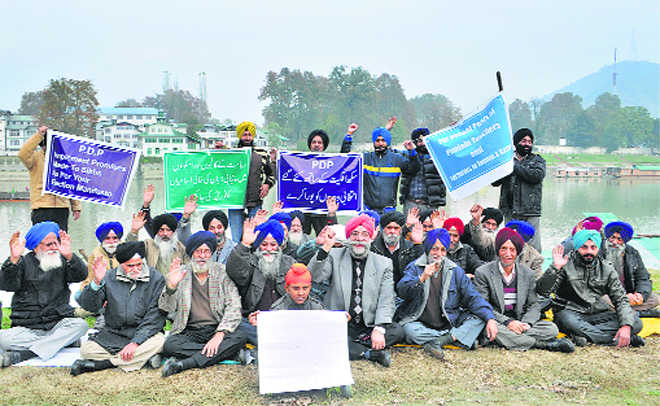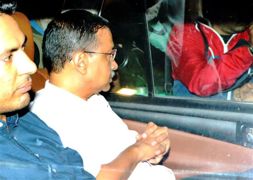
Sikhs demanding extension of the National Minority Act to Sikhs of J&K. file photo: Mohd Amin War
Arun Joshi
THE Supreme Court's refusal to direct the Jammu and Kashmir Government to constitute a commission for the minorities — Hindus, Sikhs, Buddhists and Christians — in the state may have its legal strength, and so may be the case of the Mehbooba Mufti government's affidavit in the apex court that J&K is not the only state where the national minority is in a majority. These are legal and technical arguments; but the minorities' rights and their sense of security are not — cannot be — a simple legal argument. How the minorities get treated defines a polity.
Two crucial issues are at stake. Muslims are a minority in India and since J&K is a part of the country, therefore the Muslim community here cannot be clubbed differently. Any change in their status would amount to strengthening the secessionist voices raised in the name of Muslim majority. One of the arguments of the secessionists is that J&K's Muslim majority is yet to decide its destiny. The National Conference and the People's Democratic Party, too, are pitching for more political and constitutional concessions primarily because of the Muslim-majority character of the state. That Muslims, despite being a majority in the state, are entitled to minority benefits is an extension of the thesis that the territory and the people of the state are a part of India. Here this majority and minority argument is used for polarisation to get political dividends and please radicals.
Kashmiri Hindus’ tragedy
The second part is equally disconcerting. The suffering of minorities in J&K is a self-evident reality. The way Kashmiri Hindus, better known as Kashmiri Pandits, were made to flee the Valley in the late 1980s- early 1990s is a well-documented tragedy of their persecution. The community has not been restored to the "land of their great grandfathers", despite tall claims of prime ministers from Inder Kumar Gujral to Manmohan Singh. That is just a tip of the iceberg of their plight.
Hindus — mostly now in the Jammu region — many Dogras, the erstwhile rulers of the state, still live in the gone-bye times of their monarchy. Gradually, they are realising that they are subjects and not rulers, when they find that their children get discriminated against in jobs and admissions to institutions. Christians and Buddhists, too, have been marginalised.
Plight of Sikhs
Sikhs here are torn between their self-dignity and the colossal damage to their identity. Many Sikh families fled their homes in isolated hamlets to the better-protected towns and cities. At least that was the perception because the isolated hamlets were more vulnerable to terror attacks and it was also not possible for the security forces to provide security cover to each and every home of the Sikhs. And wherever security pickets were set up initially have been withdrawn from many places.
At their new places, they are being asked to prove their residence proof of the 1950s - something that has been mandatory for granting permanent resident certificates to them or their children. Their claim that they have come from the villages and have disposed of their property and lost their property papers in the transition are dismissed as excuses by the authorities. The permanent resident certificates, known as state subject too, is a necessity for getting admission into schools, colleges, professional institutions, government jobs and purchase of immovable property in the state. The political leadership of the state was a party in denying Sikhs and other minorities their rights.
Majority-minority ties uneasy
The majority community would have loved to share things with the minorities in the state, but the distorted political narratives created a sense of unease in the relationship between the two. The marginalised Muslims have been brought under the extra-religious sentiment spell and they have forgotten about their political share and economic rights. The Muslims are told that they are in danger. Their majority (in numbers) is under threat from the Hindutva forces. This is the line of argument of the separatists in J&K. They are spreading the word that the Centre and the RSS are clandestinely settling non-Muslims from the mainland India in Kashmir to undermine the Muslim-majority character of the place. They achieve their objective of creating situations by arousing religious passions. The 2008, 2010 and 2016 agitations were given communal overtones.
Some unfortunate events such as beef controversy, lynching of Muslims and Dalits by cow vigilantes in the country, debate on Article 370 are used as tools to stir communalism. It has influenced almost all institutions. Government recruitment records show minorities are being marginalised, to the extent that there is silent migration of the minorities from the state, much to the delight of the radical elements.
The mainstream is also working in a similar direction. Its advocacy of autonomy and self-rule is directed at further marginalising the minorities. The Hindus, Sikhs, Christians and Buddhists are living on the edge because the BJP that was supposed to protect them, who had voted en bloc for the party, has succumbed to the pleasures of power and pelf. The minorities have become people of nowhere in J&K because no one is willing to recognise them as a minority and offer protection.
Hindus, Sikhs feel discriminated against
- The way Kashmiri Pandits were made to flee the Valley in the 1980s-90s is a well-documented tragedy of their persecution.
- Their children get discriminated against in jobs and admissions to institutions.
- Many Sikh families fled their homes in isolated hamlets to the better-protected towns and cities.
- At their new places, they are being asked to prove their residence proof of the 1950s.



























